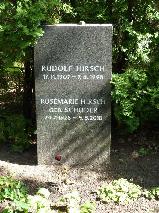Hirsch, Rudolf |
| AUTHOR (GERMANY) |
|
BORN 17 Nov 1907, Krefeld, Nordrhein-Westfalen - DIED 7 Jun 1998, Berlin GRAVE LOCATION Berlin: Städtischer Zentralfriedhof Friedrichsfelde, Gudrunstrasse, Lichtenberg (8-2) |
|
Rudolf Hirsch was the son of a rich Jewish shoe seller. He was educated between 1924 and 1928 to become a merchant. In 1931 he joined the German communist party KPD. When the nazis came to power in 1933 he emigrated to the Netherlands and Belgium, but in 1934 he returned to Germany. There he was active in the resistance for the Gruppe Neu until he left Germany again in 1938. After he wasn't allowed to stay in Sweden he went to Palestina in 1939 and there he worked as a shoemaker. Together with Arnold Zweig he led the Bewegung Freies Deutschland (Free Germany Movement). After the war he returned to Germany, where he became well known in the DDR for his 1,400 articles as a court reporter. In 1958 he married the novelist Rosemarie Schuder. In 1987 he received the Goethe Prize. He died in 1998, aged 90. In 1999 his final work "Der Gelbe Fleck" was published. It's a history of the hate for Jews in Germany and he wrote it together with Rosemarie. [Note from the editor: when the author of these pages was at the gravesite in 2004, Rosemarie Hirsch-Schuder happened to be tending the grave. She had no objection at all that a photograph of the grave was taken and told us of her thesis about the painter Hieronymus Bosch and her research for it at El Escorial near Madrid. At the time her own name was already on the grave but Rosemarie lived until 2018.] Family • Wife: Schuder, Rosemarie (1958-1998) Related persons • was a friend of Zweig, Arnold |
| Images |
Sources • Hoffmann, Joachim, Berlin Friedrichsfelde, Ein Deutscher Nationalfriedhof, Das Neue Berlin, Berlin, 2001 • Rudolf Hirsch (Schriftsteller) - Wikipedia (DE) |




